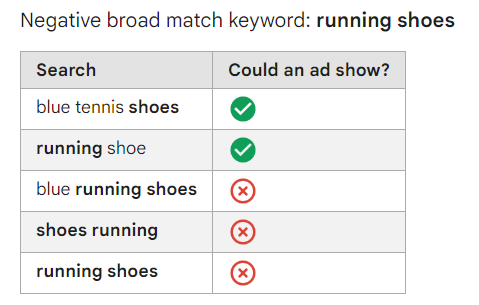Keyword stuffing was a popular SEO tactic in the late 1990s to early 2000s when search engines like Google and Yahoo relied heavily on keyword density to rank websites. But times have changed, and as search algorithms become more sophisticated, the approach to keyword usage has shifted significantly.
Today, the focus is on creating high-quality, relevant content that appeals to both search engines and users.
In this blog post, we’ll talk about why exact-match keywords are no longer the golden rule and how a strategic mix of exact, broad, and related terms can enhance your SEO efforts without compromising the natural flow of your content.
Table Of Contents:
Do SEO Keywords Need to Be Exact?
In the early days of search engines, peppering content with exact keyword phrases was the best way to rank.
Not anymore.
Search engine algorithms are now trained to better understand the intent behind a user’s query. This means that while exact match keywords still have their place, they’re not the only factor in determining rankings.
What are Exact Match Keywords?
Exact match keywords are search terms that are entered into a search engine exactly as they are. When a user types in an exact match keyword, the search engine tries to return results that closely match that exact phrase.
Here are some examples:
Keyword: “best coffee shops in New York”
In this example, the user is searching for the best coffee shops specifically in New York City. The search engine will aim to return results that match this exact phrase.
Keyword: “how to tie a tie”
This search query is looking for instructions or guides on how to tie a tie. Results that precisely match this phrase will be prioritized by the search engine.

Keyword: “iPhone 12 Pro Max reviews”
Here the user is likely interested in reading reviews specifically about the iPhone 12 Pro Max model. The search engine will prioritize results that match this exact phrase, ensuring relevance to the user’s intent.

In each of these examples, the user’s search intent is clear, and the exact match keyword helps the search engine deliver highly relevant results.
Should You Optimize Your Content for Exact-Match Keywords? Yes and No.
Is Keyword Optimization Still Relevant in 2025?
Absolutely! Keyword optimization is still relevant in 2025 but it has evolved significantly, focusing more on understanding user intent and incorporating natural language rather than just stuffing keywords. It’s a key component of a broader SEO strategy that prioritizes quality content and user experience.
Here are some key points about keyword optimization in 2025:
User Intent is Paramount
One of the most significant shifts in SEO is the emphasis on user intent. Search engines like Google are now using artificial intelligence to understand what users are truly looking for when they type in a query. This means that optimizing for keywords alone isn’t enough; you need to align your content with the intent behind those keywords.
For example, the keyword “best smartphones” could signal different intents:
Informational intent: The user is researching popular smartphone options.
Transactional intent: The user is ready to purchase and looking for deals.
Instead of fixating on exact match keywords, try to understand what drives your target audience.
What are their pain points? What questions do they need answers to? What problems do they need to solve?
Craft content that addresses those needs and you’ll be surprised at how effective it can be.
💡Tips:
- Conduct Intent Analysis: Use tools like Google Search Console and keyword research platforms to analyze search queries and understand user intent.
- Segment Content by Intent: Create dedicated pages or sections for informational, navigational, and transactional intents.
- Monitor Performance: Track how users interact with your content and refine it to better align with their expectations.
The Role of Semantic Search
Exact-match keywords are no longer the golden ticket to higher rankings. Search engines now prioritize content that demonstrates topical authority and relevance. This is where semantic SEO comes in.
Semantic search is the ability of search engines to understand the meaning and context behind a search query. Instead of just matching keywords, semantic search looks at the intent behind the query.
For example, if someone searches for “how to change a flat tire,” semantic search understands that the user is looking for a step-by-step guide, not just information about flat tires.
If someone searches for “best Italian restaurant near me,” the search engine would understand that the user is looking for a highly-rated Italian restaurant in their local area.
Semantic keywords are terms and phrases related to your primary keyword.
For instance, if your primary keyword is “vegan recipes,” semantic keywords might include terms like “dairy-free,” “plant-based meals,” and “easy vegan desserts.” Incorporating these variations naturally into your content signals to search engines that your page covers the topic comprehensively.
Now let’s take a look at our earlier sample keyword “best coffee shops in New York” and what results show up at the top of Google:

Thanks to semantic search, marketers no longer have to stuff their content with exact-match keywords to rank on Page One. You can use “best coffee shops”, “best cafes”, “New York City”, and “NYC” in your metatags and still show up at the top of the SERP.
💡Tips:
- Expand Keyword Research: Use tools like Semrush or Ahrefs to identify related terms and phrases.
- Optimize Naturally: Incorporate semantic keywords into titles, headings, subheadings, and body text without overloading your content.
- Add FAQs: Add an FAQ section to cover common questions and include semantic variations of your main keyword.
Broad Match vs. Phrase Match
Broad match allows your content to appear for a wide range of related searches, even if the query doesn’t exactly match your keyword. This can help you capture a larger audience but may result in less precise traffic.
Phrase match, on the other hand, ensures that your content appears only when the search query includes the exact phrase of your keyword, though it can include additional words before or after. This approach provides more targeted traffic and higher relevance to user queries.
Balancing these strategies — depending on your goals and audience — is key to maximizing your keyword optimization efforts.
💡Tips:
- Test Both Strategies: Run A/B tests on your paid and organic campaigns to evaluate which match type performs better for your goals.
- Refine Targeting: Use analytics to monitor the quality of traffic and adjust your strategy to improve relevance.
- Combine with Negative Keywords: For broad match phrases, include negative keywords to filter out irrelevant traffic.
The Power of Long-Tail Keywords
Long-tail keywords, which are more specific and often longer phrases, have gained immense importance in recent years. These keywords typically have lower search volumes but higher conversion rates because they cater to highly specific user queries.
For example, “best running shoes for flat feet” and “lightweight running shoes for marathons” are long-tail variations of the broader keyword “running shoes.”
By homing in on long-tail keywords and addressing niche queries, you’re more likely to attract users who are ready to take action.
💡Tips:
- Identify Niche Topics: Use tools like AnswerThePublic to discover specific, actionable queries your audience is searching for.
- Focus on User Needs: Create content that directly addresses pain points or answers questions reflected in long-tail searches.
- Optimize Meta Tags: Include long-tail keywords in your meta titles and descriptions for better visibility.
Conversational Search Optimization
With the rise of voice search and AI-driven chatbots, conversational queries are becoming increasingly common. People are now asking search engines questions in a more natural, conversational tone.
Instead of typing “weather in New York,” users might ask, “What’s the weather like in New York today?”
To optimize for conversational search, consider incorporating question-and-answer formats into your content, using natural language, and addressing common queries your audience might have.
💡Tips:
- Adopt Natural Language: Write in a conversational tone that mirrors how people speak.
- Answer Questions Directly: Use headings that include common questions, and provide clear, concise answers.
- Implement Structured Data: Use schema markup to help search engines understand your content and improve visibility in voice search results.
Topic Clusters: The New Pillar of Content Strategy
Another modern approach to keyword optimization is the use of topic clusters. This strategy involves creating a central pillar page that covers a broad topic and linking it to more specific cluster pages. This interconnected structure helps search engines understand the relationship between your content pieces, boosting your site’s authority on the subject.
For example, a pillar page on “digital marketing strategies” might link to cluster pages covering “SEO basics,” “social media marketing tips,” and “content marketing best practices.” By focusing on clusters, you’re optimizing for broader topics and their associated keywords in a more holistic way.
💡Pro Tip: You don’t have to manually build your cluster! BrandWell’s long-form content writer can automatically create a network of pillar and cluster pages for your chosen topic to help you build topical authority.
Here’s how to do it:
1. Log in to your BrandWell dashboard and choose the website you want to work on:
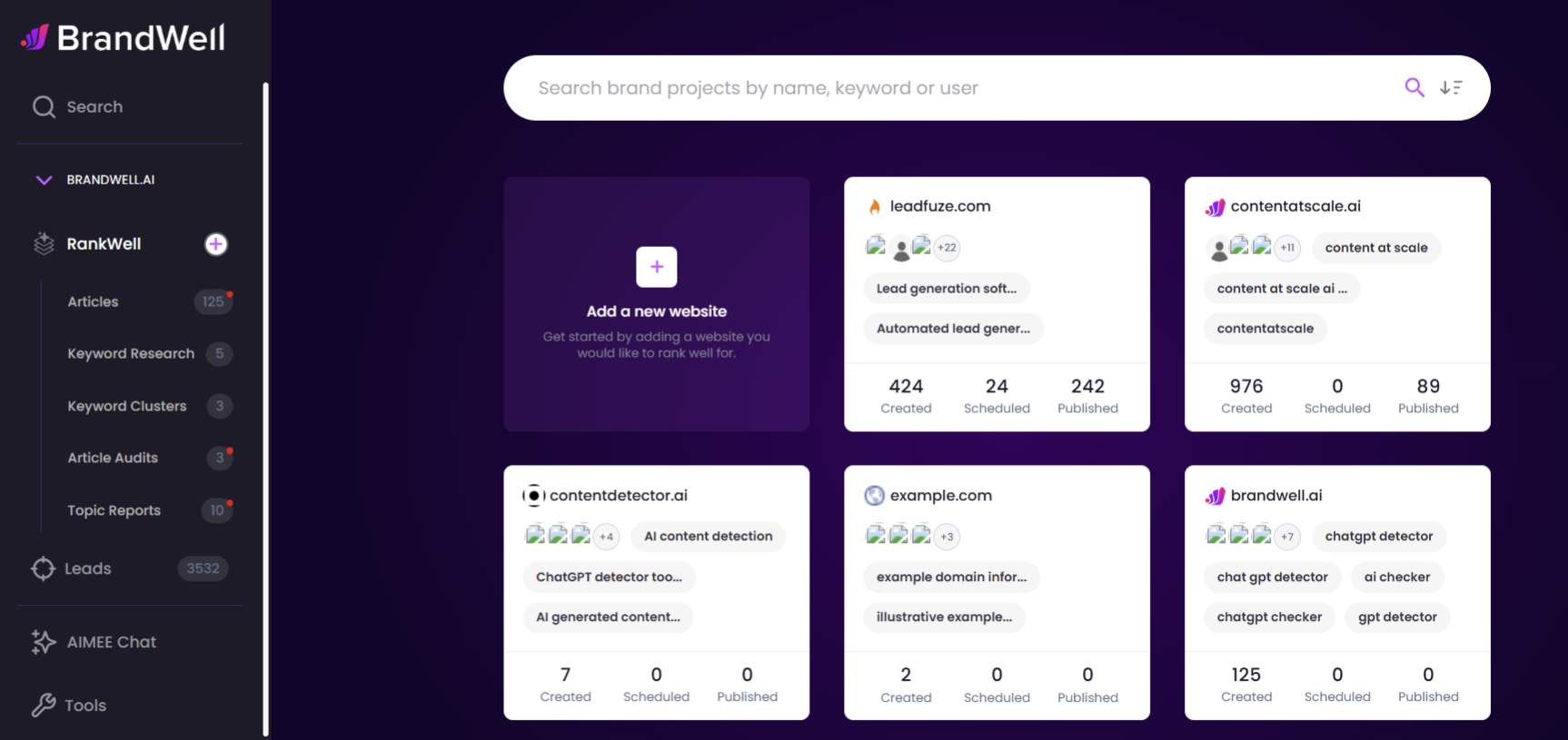
2. Click Keyword Clusters on the left column and then click the Generate Cluster button.
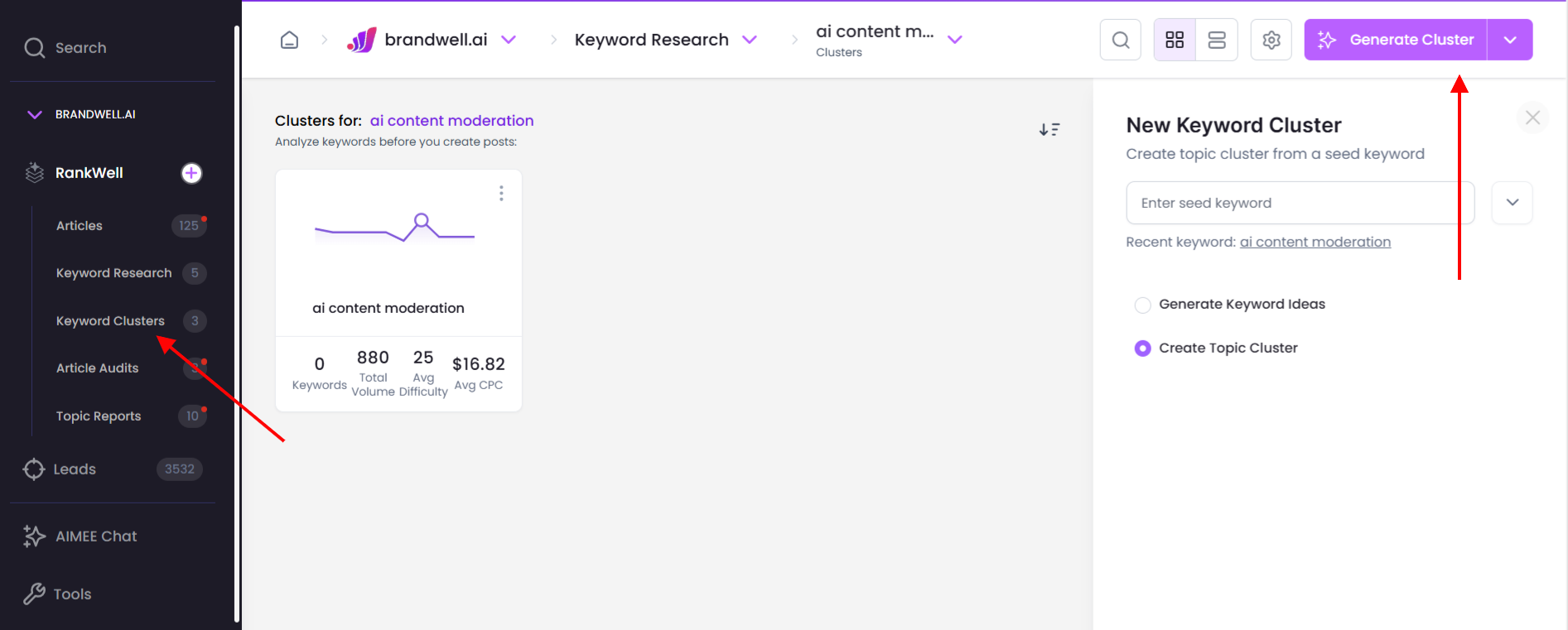
3. Enter the seed keyword you want to build a cluster around. You have two options here, generate keyword ideas around your topic or create your topic cluster now.
Here’s an example of an entire topic cluster generated by BrandWell for my seed keyword “solar lights”:
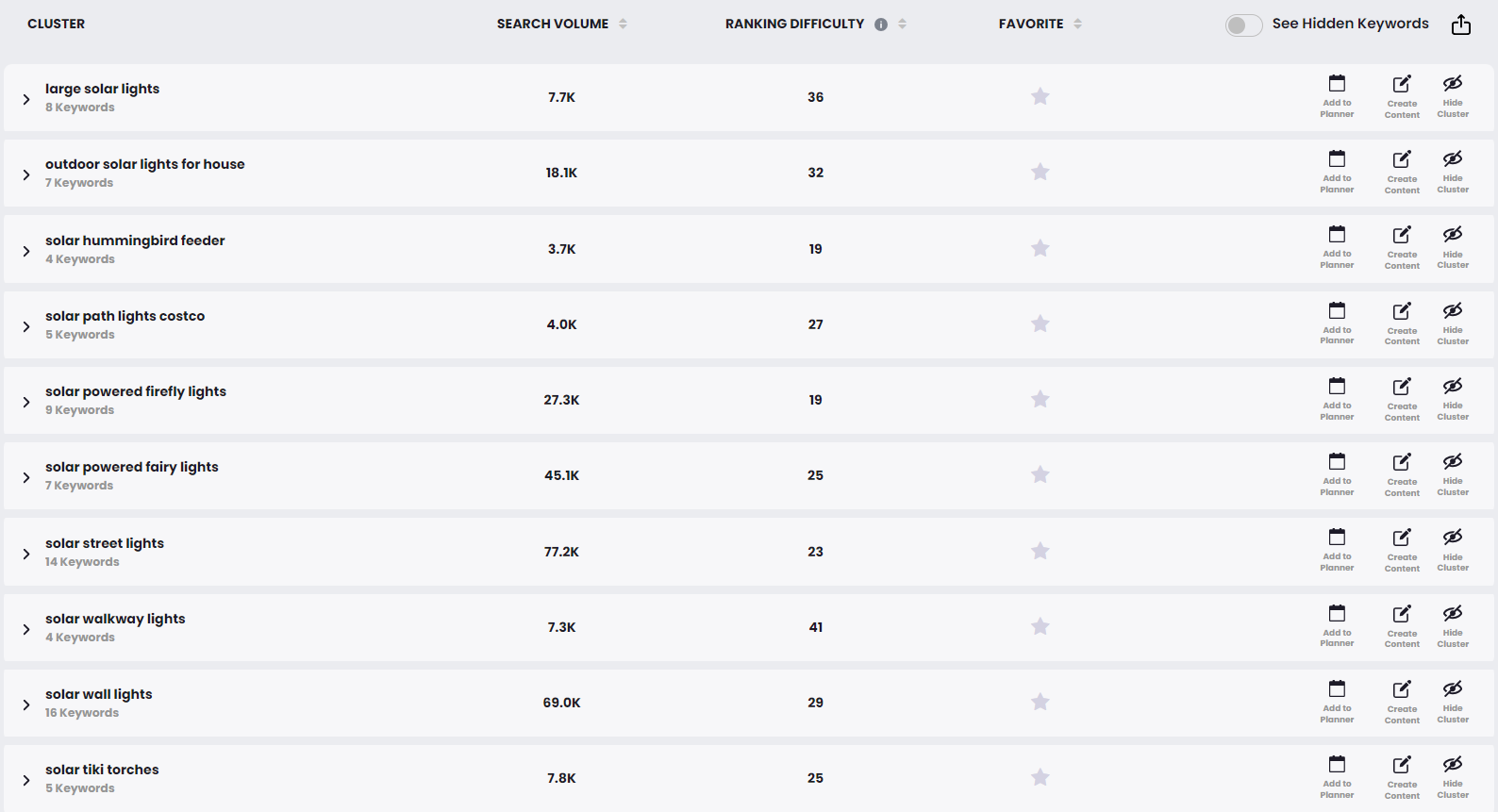
Here you’ll see the search volume and ranking difficulty for each keyword. Dig into the data and select the keywords you want to use, or click the Create Content button on the right panel to start writing your blog posts.
💡Tips:
- Map Your Content: Keyword mapping involves identifying key topics and subtopics relevant to your niche.
- Build Interlinks: Ensure all cluster pages link back to the pillar page and to each other.
- Update Regularly: Refresh pillar pages with new insights and link to new cluster pages as they are created.
Beyond Keywords: E-E-A-T and User Experience
While keywords remain essential, they’re just one piece of the SEO puzzle in 2025.
Google’s emphasis on E-E-A-T (Experience, Expertise, Authority, and Trustworthiness) means that high-quality, well-researched, and user-friendly content is crucial.
It’s not just about targeting keywords; it’s about providing real substance that genuinely helps people.
BrandWell can help you create well-written, research-backed, valuable content, fast. Just input your keyword and let the AI do its magic. Within minutes you’ll get a complete, SEO-optimized blog post that looks like this:
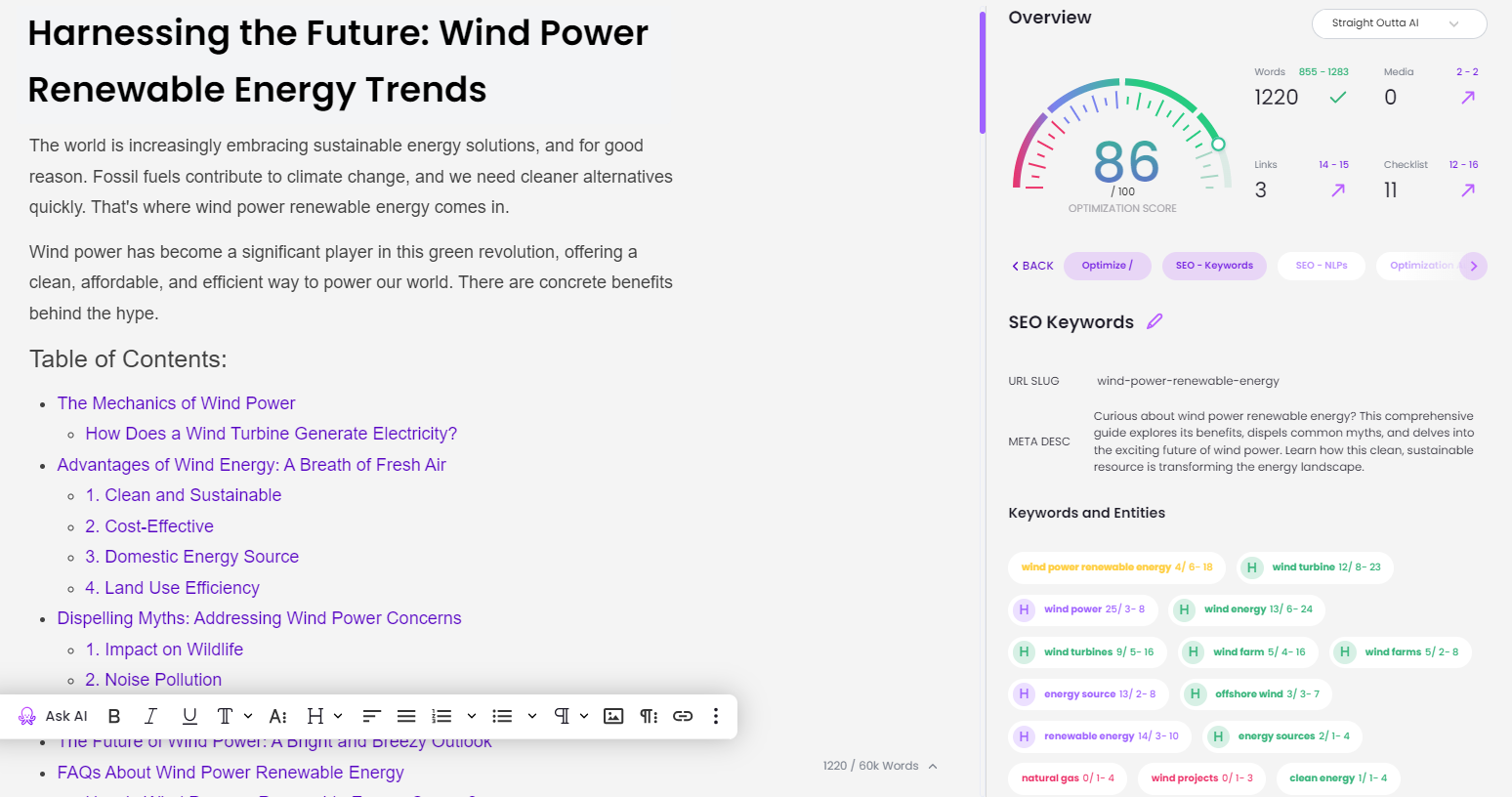
Use your keywords as a starting point, but don’t be afraid to branch out and cover related topics that will be useful to your readers. The more helpful and informative your content is, the more likely it is to rank well and attract organic traffic.
Ensure Readability and User Experience
Page experience metrics like load speed, mobile-friendliness, and Core Web Vitals play a pivotal role in determining rankings. Even the best keyword-optimized content will struggle to rank if the user experience is poor.
Content that is easy to scan and enjoyable to read is essential for keeping visitors hooked. Break up the monotony with short paragraphs, concise bullet points, and subheadings that guide the reader through your story.
Let’s face it, a website that’s a pain to read or slow to load is a major turnoff. Give your visitors a break and make sure your font sizes and colors are easy on the eyes.
💡Tips:
- Showcase Expertise: Include author bios, credentials, and links to authoritative sources.
- Optimize UX: Ensure fast load times, mobile responsiveness, and easy navigation.
- Encourage Trust: Add reviews, testimonials, and secure site certificates (HTTPS).
As someone who has been in the SEO game for a long time, I’ve seen firsthand how the landscape has changed. While exact match keywords still have their place, they’re just one piece of the puzzle.
To get people to stick around on your website, make it a joy to use and pack it with helpful content. This double whammy will not only boost user engagement but also earn you brownie points with search engines.
SEO is no longer about ranking for popular terms; it’s about being found when it matters most.
— Rand Fishkin (@randfish) June 12, 2018
FAQs: Do SEO Keywords Need to Be Exact?
Do SEO keywords need to be exact?
No, they don’t. Search engines like Google understand variations and synonyms through semantic search. So you can mix it up without losing relevance.
Should I only use exact-match keywords?
Nope, don’t limit yourself. Use a mix of broad match and phrase match keywords too. This helps capture more traffic and matches user intent better.
Do SEO keywords need to be next to each other?
No, they don’t have to sit side-by-side. Natural language processing allows for some flexibility in keyword placement within your content writing.
Conclusion
So, do SEO keywords need to be exact?
Not necessarily.
While using exact-match keywords can still be beneficial, it’s more important to focus on creating high-quality, relevant content that satisfies user intent.
As you optimize your site, keep the user in mind first and foremost. Choose keywords that accurately reflect your content, but don’t get too hung up on exact matches. With a little creativity and a lot of hard work, you can create content that both users and search engines will love.


